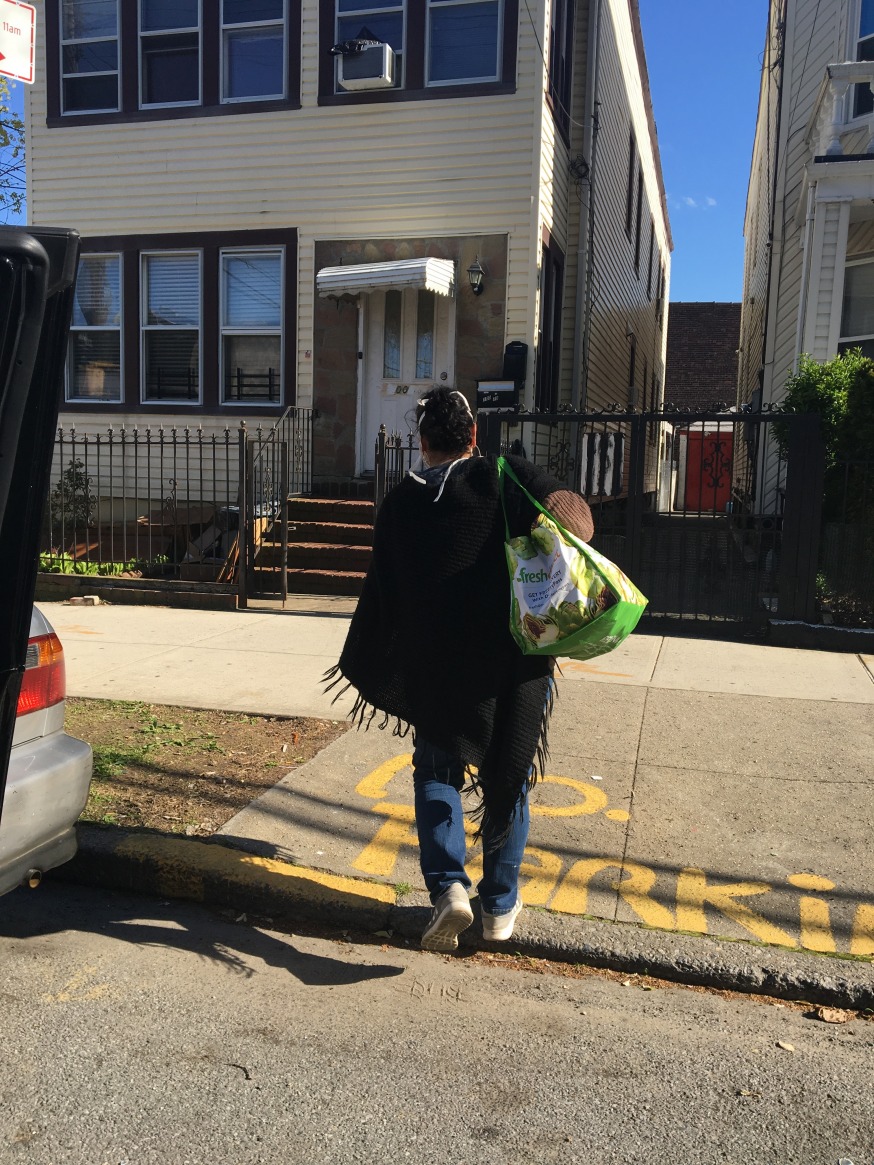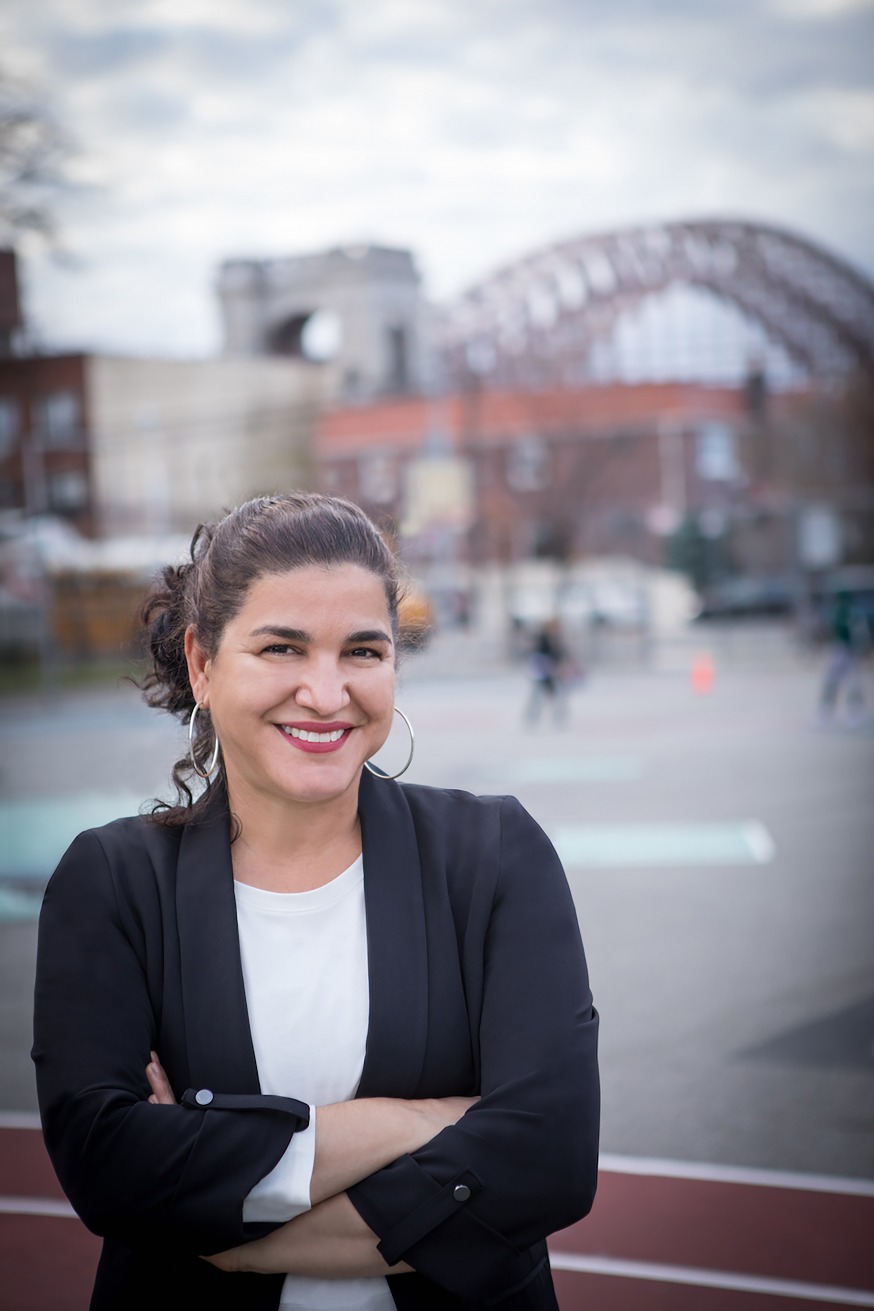
District 22 Council Candidate Evie Hantzopoulos at a food distribution for Lifeline (Photo: Evie Hantzopoulos Democrat for City Council)
April 14, 2021 Op-Ed By: Evie Hantzopoulos
One year ago today, I grabbed a used surgical mask, latex gloves, a precious bottle of hand sanitizer, and my beat up Mazda to make my way to a local Astoria bakery that had been converted to an emergency food distribution site to support people who were ineligible for government assistance.
One hour later, I found myself across the street from Elmhurst Hospital, which was surrounded by makeshift refrigerator truck morgues, tents for COVID-19 testing, and deserted streets that whispered deep pain and an eerie stillness except for the periodic sounds of an ambulance. I looked on my list and called the phone number to let the resident know I had arrived. “Comida, delivery,” I said, cursing myself for not studying Spanish in high school or college.
I placed the bags on the doorstep, which were filled with fresh produce, grains, legumes, tortillas, chicken, milk, and eggs, all provided by The Connected Chef’s Lifeline Groceries, a makeshift emergency food relief program started by Kim Calichio and Omar Bravo Pavia the week before. I gave a quick wave from the bottom of the steps to the woman who opened the door and repeatedly blessed me in Spanish while she gently sobbed. I tried to smile under my mask and told her “de nada” while resisting the urge to physically comfort her. I went back to my car and I sobbed, too.
I was not just heartbroken. I was angry that our government had once again failed on so many levels, and the most vulnerable had been left to fend for themselves.
I finished the other 15 deliveries around Elmhurst that day. Upon arriving home I removed all my clothes and bagged them, sanitized every surface I touched in my car and home, and scrubbed myself in the shower terrified that I would be carrying the virus with me somehow and would make my family sick.
So much has changed in the year since my first delivery for Lifeline Groceries. After my first week, deliveries jumped from 75 to 200 families, and now over 2000 families are served weekly. The constant cleaning and sanitizing have become part of my daily routine although sometimes I miss a beat. Hanging by my front door are a range of masks to choose from. My car is always stocked with extra masks, hand sanitizer, and gloves.
Most important, excluded workers will finally see relief thanks to legislation passed at the state level and other support is coming down from our federal government to help us recover from the pandemic. More and more people are getting vaccinated.
But the pandemic continues, and the root causes of so much injustice remain. Evictions are on pause but affordable housing remains elusive while developers profit. Vaccinations are free but healthcare is inequitable and we still lack services and hospital beds in high need areas. Lines at food pantries continue to wrap around the block and Lifeline Groceries still has a waiting list.
Mutual aid – in which people take responsibility for caring for one another and changing political conditions – stepped in because our government failed. Miserably.
As a co-founder of Frontline Foods Queens, which has injected over $700,000 into the local restaurant economy to provide meals for frontline healthcare workers, NYCHA residents, and food pantries, I know our efforts can only do so much in keeping our favorite restaurants afloat.
As a founding team member of Astoria Mutual Aid Network, I know that the work we have done to help neighbors has made our community stronger but we refuse to let our government off the hook in ensuring that everyone lives in dignity. Kim and Omar knew our government and elected officials didn’t have the ability to pivot effectively in a crisis, so they did. So many did, including those who were excluded.
As we look to rebuild and create a city that is equitable, we must not only step in to fill the gaps; we must demand that systems be changed.
Folks who experience food insecurity often find themselves on the brink of losing their homes. We need to guarantee safe, decent, affordable housing for all.
A broken food supply chain rewards big agribusiness at the expense of small sustainable farmers and ignores grassroots food justice activists who have holistic local solutions. We need to nurture food sovereignty and community self-determination and fund these efforts.
A top-down COVID healthcare response has deprived the most affected communities with the healthcare and vaccines they need. We need to develop culturally relevant and free healthcare so our Black and brown neighbors, seniors, and immigrant families have access to and trust in our healthcare system.
It’s not enough to have ideas. We need to get things done. Only when we include the voices of those who are on the ground, center the voices of those affected, and break through oppressive systems, will we be truly able to build an equitable city.
Evie Hantzopoulos is a candidate for NYC Council District 22. She is on the founding board of The Connected Chef/Lifeline Groceries, a member of Community Board 1 Queens, and the Executive Director of Global Kids.

